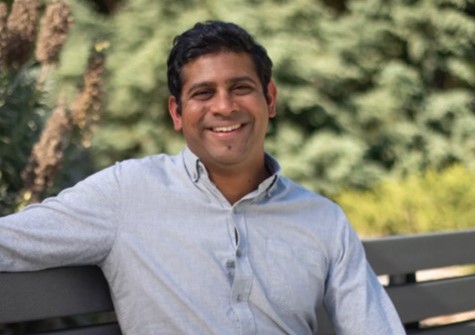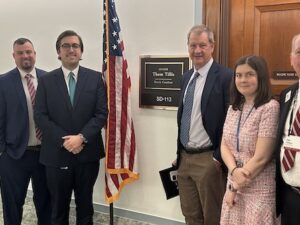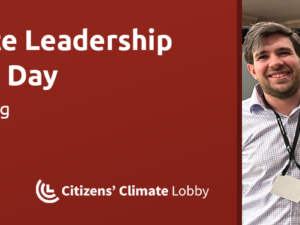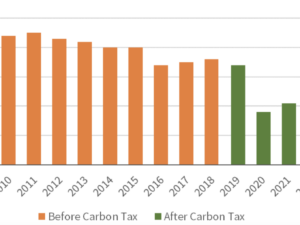By Vik Tantry
I am a capitalist. I bootstrapped a successful software company on the core values of grit, resilience, and hard work. Today, we employ more than 60 innovative team members and serve more than 200,000 small businesses around the country, landing a place on Inc’s fastest-growing companies in America. I believe fervently in free markets, innovation, and economic growth, all of which are threatened by the biggest economic risk of our time: climate change.
If left unabated, climate change will wreak havoc on the economic growth that drives free markets. A study by Schroder’s found that, over the next 30 years, climate risks would cut the GDP growth of emerging markets like India to a third of their original forecast. Simply put: unabated climate change will force more people to compete for fewer resources, further driving up inflation, which is already getting out of hand. Everyone, rich and poor alike, will have to work harder to earn less.
What drives this? Stronger and more frequent natural disasters disrupt supply chains, destroy property, and make insurance markets less predictable. Rising sea levels are projected to flood half the housing market of 300 U.S. coastal cities by 2100, causing $900 billion of damage and property loss. Agriculture will be less productive with less predictable growing seasons and increasing drought.
Many of my wealthy friends remain unconcerned. They believe they’ll be able to physically shelter themselves from climate change. That might be true — but protecting their assets from climate impact is a different story. Climate change creates volatility amongst all real assets, compressing real returns and increasing the cost of capital.
But here’s the thing — free markets don’t have to be wrecked by climate change. In fact, a market with fair competition may be the only way to reverse it. Markets are free and fair when the producers of goods who reap the profits are also paying for the cost of production. But right now, polluters pump greenhouse gasses into the atmosphere, externalizing the cost of climate damage to everyone else. Elon Musk says it well when he calls this a massive “hidden subsidy” that unfairly favors polluters in the marketplace, on the scale of $5.9 trillion per year worldwide.
The solution is simple — eliminate the invisible subsidy with a carbon price.
A well-designed carbon price is an elegant way for markets to solve climate change. It puts the cost of the externality (carbon pollution) back in the ledger of the producer and lets the free market do the rest. The government doesn’t arbitrarily pick winners and losers with red tape or regulations — the free market chooses winners based on their ability to innovate carbon out of their products. It can single-handedly reduce emissions 50% by 2030 with a moderate price, and 3,600 U.S. economists — including many fiscal conservatives like George Shultz and Alan Greenspan — have said it’s the only way that we can transition to a low carbon economy quickly and painlessly.
Moreover, there is a significant financial benefit to acting quickly. Speeding this transition can save up to $10 trillion worldwide by 2050, according to a 2020 Oxford paper, because it moves energy production to low-cost energy sources, rather than locking in more expensive fossil fuel infrastructure. These $10 trillion in savings will flow into the hands of owners of equities and real estate. If we do not act, these long-term economic gains will be forever lost.
Moreover, a carbon price can be designed to support conservative, free-market ideals. The revenue can be used to send dividends to every American household, or to lower other taxes so that the government doesn’t grow in size. A carbon border adjustment also cripples the economies of autocracies like Russia, which rely heavily on oil and gas to finance their military operations.
A carbon tax is increasingly finding common ground across the aisle. Republican Senators Lisa Murkowski, Mitt Romney, Mike Braun, and Lindsey Graham have said they are open to the idea, and they’re backed by 33 College Republican state chairs. And a conservative-led push to enact carbon pricing could corral Democrats into the free-market solutions — they came within one vote of a carbon price in 2021 after their regulatory attempts failed. We’re one of the two developed economies without a national carbon price. As Democrats continue to take climate change seriously, a conservative-led push for carbon pricing is tough for them to oppose.
So here’s what I propose: Let’s get in the game, and bring free-market thinking to the conversation. Call your member of Congress and tell them to support carbon pricing and other market-friendly climate policies. And, get involved with groups like the Conservative Caucus of Citizens’ Climate Lobby. These solutions are possible, and necessary within the next decade to avoid the worst economic effects. Let’s push Republicans and Democrats alike to preserve economic growth and wealth for all of us, and hold them accountable if they do not.
Vik Tantry is the Co-Founder and CEO of FormSwift, a software company focused on automating contracts for small businesses and freelancers. FormSwift has bootstrapped to more than 60 team members and hundreds of thousands of customers. Vik also serves as an advisor to several venture capital funds, and has served as an early marketing consultant to iconic companies like Dropbox.






